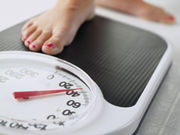Increased self-efficacy over time seen for participants in high/consistent self-weighing group
MONDAY, March 7, 2016 (HealthDay News) — High/consistent self-weighing is associated with increased eating self-efficacy (SE) over time, according to a study presented at the American Heart Association’s Epidemiology and Prevention/Lifestyle and Cardiometabolic Health 2016 Scientific Sessions, held from March 1 to 4 in Phoenix.
Yaguang Zheng, Ph.D., R.N., from Boston College in Chestnut Hill, Mass., and colleagues conducted an analysis of data from a 12-month behavioral weight-loss interventional study. Participants were given a Wi-Fi-enabled scale to transmit weight data, and were classified into three self-weighing patterns: high/consistent (more than six days/week), moderate/declined (declined from four-five to two days/week), and minimal/declined (five-six to zero days/week). SE was assessed semiannually using the Weight Efficacy Lifestyle scale, yielding ratings of one’s confidence to avoid overeating under varied conditions.
The researchers identified a significant group effect for changes in the subscale score of negative emotions, a group-by-time effect for social pressure, and a time effect for positive activities. From baseline to six or 12 months, the high/consistent self-weighing group showed significant increases in each subscale score and total score, with the subscale score of social pressure having a marginally significant increase at 12 months. No changes over time were seen in the other two groups.
“Participants in the high/consistent self-weighing group reported increased SE over time for eating in different contexts,” the authors write. “Future work needs to explore strategies to improve eating self-efficacy and self-weighing for those unable to establish this habit.”
Copyright © 2016 HealthDay. All rights reserved.








